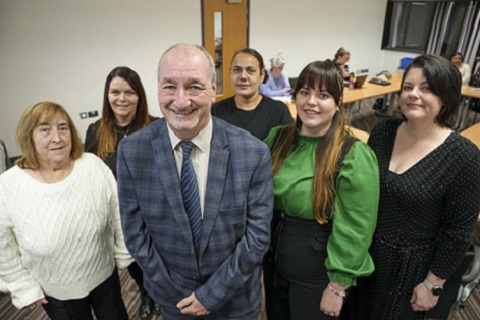A world-first research programme that will identify adults at high risk of developing type 1 diabetes opens for recruitment today.
Launched as part of World Diabetes Day, the Type 1 Diabetes Risk in Adults (T1DRA) study aims to recruit 20,000 adults, aged between 18 and 70, from the general population to assess their risk. With a similar study for children – ELSA – launched last year, it means the UK is now the first country to offer general population type 1 diabetes screening for both children and adults, in a research setting.
Funded by The Leona M. and Harry B. Helmsley Charitable Trust and drawing on the UK’s longest running study of type 1 diabetes, the Diabetes UK-funded Bart's Oxford Family study (BOX), T1DRA will answer critical questions about the development of adult-onset type 1 diabetes. It will also give those identified as high risk the opportunity for type 1 diabetes education and monitoring, and access to clinical trials testing the newest innovations in type 1 diabetes treatment, which could prevent or delay the condition.
Type 1 diabetes is a serious, lifelong autoimmune condition affecting up to 400,000 people in the UK. It occurs when the immune system destroys insulin-producing cells in the pancreas, meaning people can no longer make their own insulin and their blood sugar levels become dangerously high. More than half of type 1 diabetes diagnoses are in adults, but its development has mostly been studied in children and adult-onset type 1 is not well understood.
T1DRA will be open to those with no close family members with type 1 diabetes, who make up about 90% of those with the condition. The research team, led by Professor Kathleen Gillespie at the University of Bristol, will send participants test kits in the post, involving a finger prick blood test. They will examine the blood samples for markers of type 1 diabetes, called islet autoantibodies – proteins used by the immune system to earmark insulin-producing cells for destruction. Islet autoantibodies are linked with the development of type 1 diabetes, and can appear in the blood years, or sometimes decades, before people begin to experience any symptoms.
People identified as high risk will be followed up by the research team to examine how many develop type 1 diabetes, how quickly they progress to a clinical diagnosis and to identify which genetic, biological, and environmental factors can be linked with symptoms developing quickly. High risk participants will be offered access to information about the symptoms of type 1 diabetes, its management, and clinical trials testing new type 1 therapies.
While insulin therapy is required to manage type 1 diabetes, there are new immunotherapies on the horizon that could prevent or delay the condition. One such treatment, teplizumab, which has been found to delay a diagnosis of type 1 diabetes by on average three years, was approved for use in the US in 2022 and is currently being reviewed for approval in the UK. Several other immunotherapies for people at high risk of developing type 1 diabetes are currently being tested in clinical trials.
To sign up to the T1DRA study visit: t1dra.bristol.ac.uk.
T1DRA joins the ELSA (EarLy Surveillance for Autoimmune diabetes) study, a type 1 screening trial for children currently running nationwide. Funded by Diabetes UK and JDRF and led by Professor Parth Narendran at the University of Birmingham, ELSA is aiming to screen 20,000 children, aged 3-13 years.
One year since the launch of ELSA on World Diabetes Day 2022, 10,000 children have been recruited into the study and the team are aiming to recruit a further 10,000 over the coming 18 months. Interested families can find out more at elsadiabetes.nhs.uk.
Professor Kathleen Gillespie, lead researcher on T1DRA, at the University of Bristol, said: “This research will help us get a much clearer idea of how many adults in the UK are at risk of type 1 diabetes by screening for markers in blood samples. We will follow up those individuals with islet autoantibodies to better understand how type 1 diabetes occurs in adults and offer participants the opportunity to participate in clinical trials to prevent the condition.”
Maryaline Coffre, PhD, Program Officer at Helmsley Charitable Trust, said: “At Helmsley, we are committed to supporting people with and at risk of developing type 1 diabetes. This study will provide important insight into disease development in adults, potentially paving the way for new therapeutic strategies for the disease.”
Head of Head of Midlands and East at Diabetes UK, Peter Shorrick, said: “We’re delighted that the pioneering T1DRA programme is now recruiting and hope it will offer a better future for adults at high risk of developing type 1 diabetes. With the ELSA type 1 diabetes screening study actively recruiting children, the UK is at the forefront of research that will bring us closer to the day when risk of type 1 diabetes can be spotted early, and a diagnosis prevented.”
Retired accountant Devanshi Mavani, 65, from Leicestershire, was diagnosed with type 1 diabetes in 2017, when she was 59. She was treated in hospital for diabetic ketoacidosis, a life-threatening complication of type 1 diabetes.
Devanshi said: “Being diagnosed in my 50s was a major shock and if I’d known it was coming, I could have been more prepared. The T1DRA trial is important because it will help identify type 1 diabetes early – and give others the chance to be more prepared than I was.”
About Diabetes UK:
1. Diabetes UK’s aim is creating a world where diabetes can do no harm. Diabetes is the most devastating and fastest growing health crisis of our time, affecting more people than any other serious health condition in the UK – more than dementia and cancer combined. There is currently no known cure for any type of diabetes. With the right treatment, knowledge and support people living with diabetes can lead a long, full and healthy life. For more information about diabetes and the charity’s work, visit www.diabetes.org.uk
2. Diabetes is a condition where there is too much glucose in the blood because the body cannot use it properly. Without the support to manage it well, both type 1 and type 2 diabetes can lead to devastating complications. Diabetes is one of the leading causes of preventable sight loss in people of working age in the UK and is a major cause of lower limb amputation, kidney failure and stroke.
3. People with type 1 diabetes cannot produce insulin. About 8 per cent of people with diabetes have type 1. No one knows exactly what causes it, but a family history of type 1 increases the risk of developing it. Type 1 diabetes is not currently preventable. It’s the most common type of diabetes in children and young adults, starting suddenly and getting worse quickly. Type 1 diabetes is treated by multiple daily insulin doses – taken either by injections or via an insulin pump. It is also recommended to follow a healthy diet and take regular physical activity.
4. People with type 2 diabetes don’t produce enough insulin or the insulin they produce doesn’t work properly (known as insulin resistance). Around 90 per cent of people with diabetes have type 2. They might get type 2 diabetes because family history, age and ethnic background puts them at increased risk. They are also more likely to get type 2 diabetes if they are living with obesity or overweight. People from the most deprived areas are also more at risk of developing type 2. It starts gradually, usually later in life, and it can be years before they realise they have it. However, we are seeing more young people, including children, developing it. Type 2 diabetes is treated by getting support to manage your weight, eating a healthy diet and increasing physical activity. In addition, medications including tablets, insulin and non-insulin injectables are usually required.
5. About 2 per cent of people have other types of diabetes. Other types include 11 different forms of monogenic diabetes, gestational diabetes, cystic fibrosis related diabetes and diabetes caused by rare syndromes. Certain medication such as steroids and antipsychotics, surgery or hormonal imbalances could also lead to other types of diabetes.












